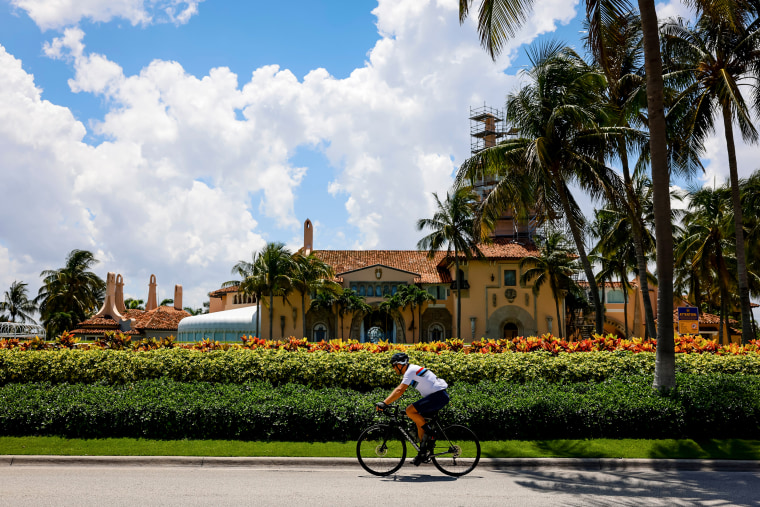For Donald Trump, loyalty was always key.
“I value loyalty above everything else,” he once wrote.
It’s a striking reminder for those who now face legal jeopardy for their associations with the former president.
This week, the legal risks for two aides who’ve worked for him in Florida came into sharper view. But their once-overlapping representation is also raising fresh legal and ethics questions based on revelations in the new, or superseding, indictment unsealed Thursday.
The initial indictment charged Trump and his valet, Walt Nauta, but the new indictment involves a third individual — the Mar-a-Lago property manager, Carlos De Oliveira. It’s De Oliveira’s interactions with yet another Mar-a-Lago employee, the director of information technology, that’s raising eyebrows.
NBC News has confirmed that person is named Yuscil Taveras, and he’s described in the court papers “Employee 4.”
According to prosecutors, after Trump’s attorneys were served with a grand jury subpoena requiring he turn over security camera footage from Mar-a-Lago, De Oliveira asked Taveras for a private conversation, where he told him “that ‘the boss’ wanted the server deleted.”
Taveras balked — according to the superseding indictment — but De Oliveira pressed for a solution, saying again, “‘the boss wanted the server deleted’ and ‘what are we going to do?’”
What exactly happened to the server after that point is unclear, but Nauta later calls another unnamed Trump employee and “said words to the effect of, ‘someone just wants to make sure Carlos is good.’” That unnamed employee assures Nauta that De Oliveira is “loyal” and on the same day, “Trump called De Oliveira and told De Oliveira that Trump would get De Oliveira an attorney.”
Based on Federal Election Commission filings and public reporting, it appears Trump made good on that promise. Trump’s PAC paid $189,040 in 2022 to the law firm where De Oliveira’s lawyer, John Irving, is a partner. Irving isn’t representing De Oliveira alone, and some of that money may be related to other clients. Irving has been reported to represent several others close to Trump, including Peter Navarro, Stephen Miller, GOP Rep. Scott Perry of Pennsylvania, and may have other witnesses as clients. When contacted by NBC News, Irving declined to comment about De Oliveira’s indictment or his representation.
A corporation paying for its workers’ lawyers is not unusual, especially where the employees cannot afford counsel on their own. How it operates in practice is a different matter.
“As a matter of legal ethics you can have a third party paying those legal fees. The lawyer owes the duty of loyalty to the client, not the person paying the fees — that’s the doctrine, but the reality is sometimes different,” says Kathleen Clark, a law professor at Washington University.
Stephen Gillers, professor of law at New York University School of Law, says the “danger signs” are if the organization chooses the attorney for the employee and the worker doesn’t get a say in the matter, or the lawyer also represents the organization itself — which does not appear to be at issue in the Trump case.
The more potentially perplexing conflict of interest is one that arises when a lawyer represents multiple witnesses to a crime, and one of those individuals subsequently faces criminal exposure himself.
“It’s very risky for such a person to be represented by someone who owes loyalty to someone else,” Clark explained.
Trump’s Save America PAC is paying other lawyers like Washington-based attorney Stanley Woodward, who represents people involved in the special counsel's investigation into both Trump’s handling of classified materials and his efforts to overturn the 2020 election.
Woodward is currently counsel of record for Nauta, and for some period of time also represented Taveras — it’s unclear if he will going forward. But many details in the superseding indictment leave the strong impression that Taveras is cooperating with the prosecutors in some capacity — particularly the evidence surrounding his alleged conversations with De Oliveira about the server.
“This is not rocket science,” Gillers said. “You can’t represent a cooperator and someone fighting an indictment [like Nauta] in the same transaction.”
Woodward declined to comment to NBC News.
But special counsel Jack Smith might not be willing to take the risk, even if Nauta and Taveras don’t object to having Woodward as their attorney.
All defendants have a right to effective counsel under the Sixth Amendment, and if either individual later challenged Woodward’s representation on appeal and won, Smith’s entire case could fall apart.

